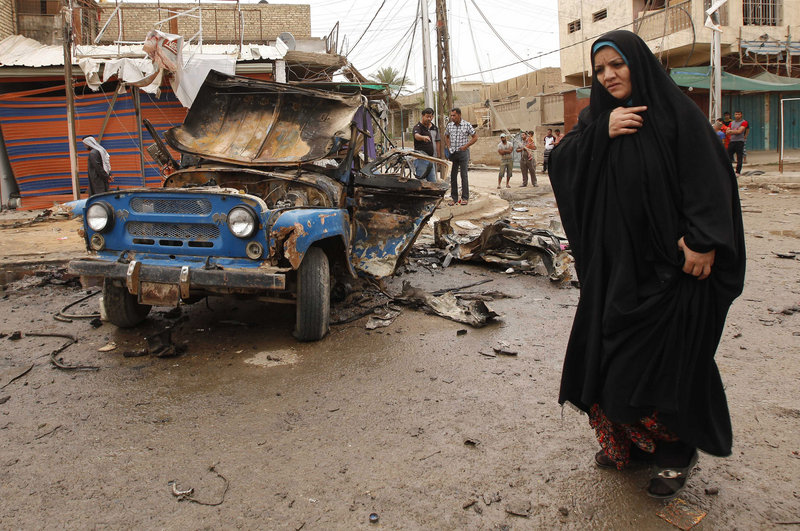BAGHDAD – Car bombs around Iraq killed at least 65 people Monday amid the worst wave of violence in the country since U.S. troops withdrew a year and a half ago.
The attacks, which occurred along busy commercial streets in Shiite and Sunni areas, followed a string of bombings and other attacks last week that killed more than 200 people. The ongoing violence has stoked the impression among Iraqis that the country is sliding back into chaos reminiscent of the civil war that claimed tens of thousands of lives between 2005 and 2008.
Citing a number of sources, The Associated Press put the death toll Monday as high as 95.
Among the most worrying of the day’s attacks were a pair of car bombings in the southern city of Basra that killed at least 10 people. The previous day, Basra’s security commanders asserted that they had imposed new protective measures in the region.
The Basra attack drew attention to how even the south is no longer free from strife. The region, with its Shiite Muslim majority, has been relatively quiet compared with areas in the north such as Baghdad, where Shiites and the country’s Sunni Muslim minority live close together.
Sunnis, who believe they have been marginalized since the fall of President Saddam Hussein in 2003, have served as the backbone of a tenacious resistance to the country’s Shiite-dominated government.
The bloodshed, coupled with an intractable dispute between Prime Minister Nouri al-Maliki and Sunni protesters who are demanding a repeal of laws they say discriminate against them, has left many fearful that Iraq is on the verge of splintering.
Security forces opened fire on demonstrators late last month in the northern city of Hawija, sparking days of violence in central and northern Iraq. The United Nations put the death toll for April at 712, making it the deadliest month in Iraq since June 2008. The unrest raises the specter of Iraq imploding at a time neighboring Syria is being torn apart by civil war.
In the aftermath of Monday’s bombings, al-Maliki warned lawmakers to stay away from a parliamentary session scheduled for Tuesday by his rivals to discuss the spiraling violence. He accused politicians he refused to name of being behind the unrest, and he threatened to send their names to the courts for arrest if they were not already wanted, saying some instigators of violence were trying to hide behind parliamentary immunity.
Many Baghdad residents were shaken by the bombings and the political discord.
“We still have a dream that one day all of us could see Baghdad without an explosion. It seems that day will never come,” said grocery shop owner Aamer Abdullah, 55. “The citizens of Baghdad prefer to stay in their homes instead of going out and getting killed. We blame the politicians and the security forces equally for what happened.
“Iraq now is heading to the abyss,” he said.
Send questions/comments to the editors.



Success. Please wait for the page to reload. If the page does not reload within 5 seconds, please refresh the page.
Enter your email and password to access comments.
Hi, to comment on stories you must . This profile is in addition to your subscription and website login.
Already have a commenting profile? .
Invalid username/password.
Please check your email to confirm and complete your registration.
Only subscribers are eligible to post comments. Please subscribe or login first for digital access. Here’s why.
Use the form below to reset your password. When you've submitted your account email, we will send an email with a reset code.